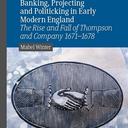Dr Mabel Winter
I am a socio-economic historian of early modern England. My primary research interests lie in banking and finance; urban and civic politics; projecting and improvement; and the everyday history of provisioning, with a particular focus on grain and milling.
I undertook my undergraduate, master's and PhD degrees at the University of Sheffield, and have since held research positions on two AHRC-funded projects. The first position was research associate on the ‘Middling Culture’ project at the University of Kent, and the second is my current role as research associate on the project ‘The Politics of the English Grain Trade, 1315-1815'.
Research Interests
I work on the social, economic, and cultural history of early modern England. My doctoral thesis, first article, and first monograph focused on the relationship between commerce, politics, and economics through the lens of a late-seventeenth-century financial institution. I took a microhistorical approach, examining the London-based institution of Thompson and Company, the social networks of its partners, the identity of its creditors, and the events and circumstances that led to its collapse. The book situates the reconstructed institution within the wider commercial, financial, and political contexts of seventeenth- and eighteenth-century England, using the evidence accrued to question the traditional narrative of financial and commercial development; credit systems; the relationship between economics, finance, commerce and politics; and the place of risk and strategy in gendered relations, credit, and social status.
A subsequent publication took my interest in politics and projecting to bear on provincial England and the provision of water. This article was a result of my work on the ‘Middling Culture’ project and examines the relationship between the urban ‘middling’ sort and public services in provincial England in the period 1540 to 1640, through a case study of water provision in three urban centres.
My current work for ‘The Politics of the English Grain Trade’ project further explores the history of everyday provision through a study of mills and milling. Outputs underway include a case study article of mills in Devon, which examines the role of mills in economic and social life in early modern England, as well as two co-written articles exploring mill litigation and the business of milling over a long period. Through the project more broadly I am investigating the legal and social history of the grain trade, its technological development, and its cultural associations.





